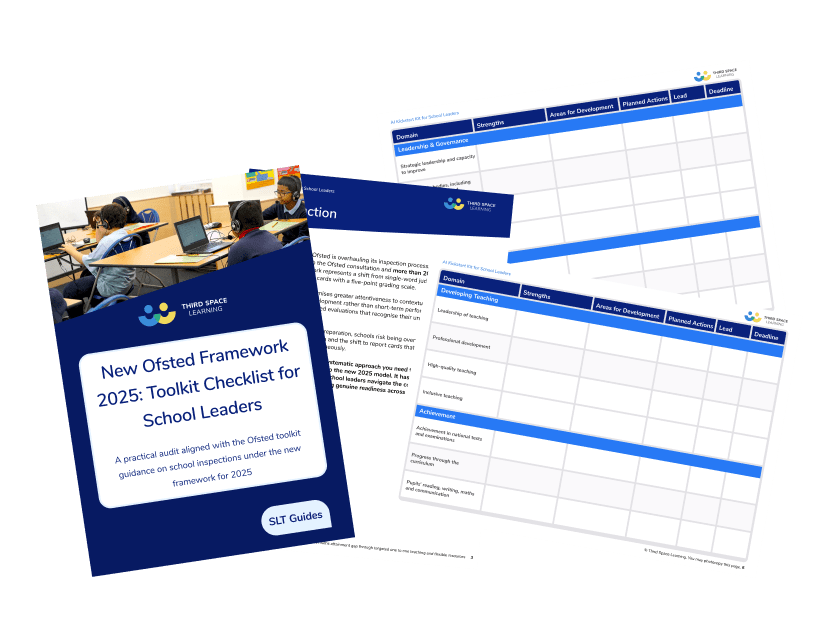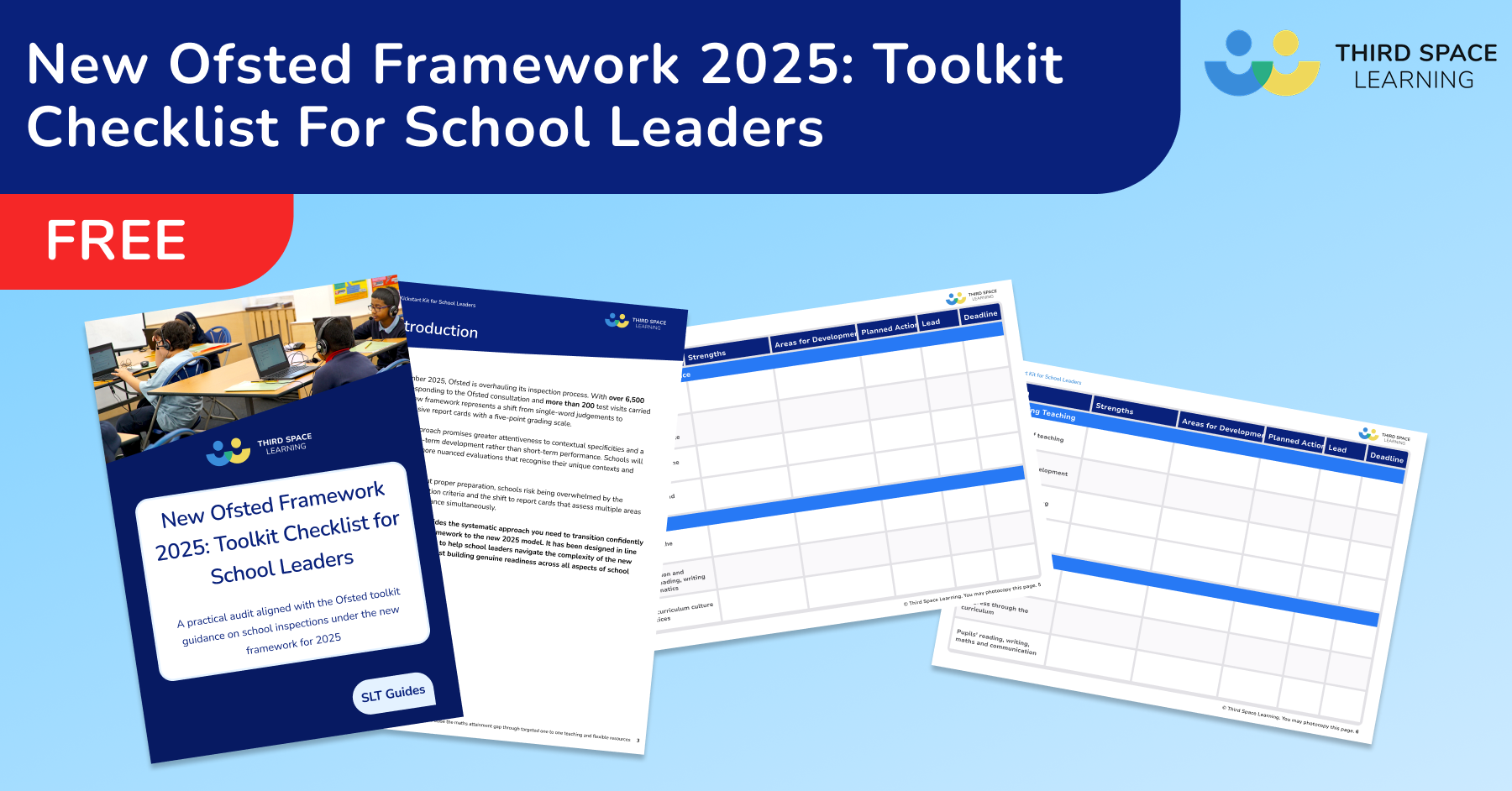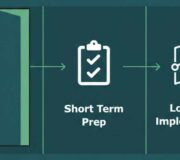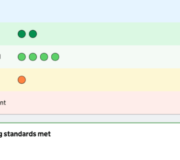What Every School Leader Should Know About A Section 5 Ofsted
This article was originally posted on 22nd March 2024. Ofsted has recently released its new Ofsted framework 2025, which uses a new inspection framework.
Section 5 Ofsted inspections are routine inspections carried out by Ofsted across England to provide independent judgements on the quality of education provided in different settings. Ofsted inspections play a key role in ensuring that schools are held accountable for the quality of education they provide and provide parents with comparable data to make informed choices regarding their child’s schooling.
However, section 5 Ofsted inspections can be stressful for school leaders and staff, but with suitable preparation, stress can be prevented.
This article will guide you through everything a headteacher and school leader needs to know about section 5 Ofsted inspections: what they are, what to expect, the grade descriptors the inspection teams use and how the school handbook and inspection framework prepare you for a successful visit.
What is section 5 Ofsted?
Section 5 Ofsted is a graded inspection that is carried out under section 5 of the Education Act 2005. This act requires Ofsted to inspect schools at regular intervals.
Section 5 inspection intervals should be no longer than 5 years apart, however, if your school’s most recent graded or ungraded inspection was before May 2021, the legal interval is to be no more than 7 years for the routine inspection.
Under a section 5 inspection, Ofsted will make graded judgements using the four-point Ofsted rating scale against:
- Quality of education
- Behaviour and attitudes
- Personal development
- Leadership and management
- Early years provision and sixth form provision (if the setting provides these phases)
As of September 2024, Ofsted will no longer make single-word judgements on the overall effectiveness of a school. Further changes will come into effect from September 2025 where School Report Cards will be introduced to provide parents with a full and comprehensive assessment of how schools are performing.
New Ofsted Framework 2025: Toolkit Checklist
A practical audit aligned with the Ofsted toolkit guidance on school inspections under the new framework for 2025. Includes an actionable checklist.
Download Free Now!What is the difference between section 5 Ofsted inspection and section 8?
The main difference between section 5 Ofsted inspection and section 8 Ofsted inspection is that section 5 inspections are graded while section 8 inspections are ungraded.
All schools are eligible for a Section 5 graded inspection however most (but not all) good or outstanding schools receive an inspection under Section 8 of the Education Act 2005 instead.
During both section 5 and section 8 Ofsted inspections, inspectors will use the Education inspection framework (EIF). The new Ofsted framework 2019 details how Her Majesty’s Inspectors (HMI) conduct inspections for maintained schools, academies, non-association independent schools, further education and registered early years settings in England. Along with the school inspection handbook, the framework informs headteachers and senior leaders how HMI makes judgments about the effectiveness of schools/colleges and explains what the different stages of an inspection entail.
A difference between a section 5 Ofsted inspection and a section 8 Ofsted inspection is the inspectors’ focus. The purpose of a section 8 inspection is to confirm whether or not a school maintains its good or outstanding gradings and that safeguarding is effective. It is sometimes referred to as a monitoring inspection. From September 2024, Ofsted will remove deep dives from ungraded inspections.
So, what do Ofsted look for in a section 8 inspection? There will likely be fewer inspectors onsite and their focus in on the quality of education. This is in contrast to a section 5 inspection where inspectors will look at all 4 key judgements.
Both section 5 and section 8 inspections last 2 days. Previously, section 8 short inspections of good schools lasted only one day.
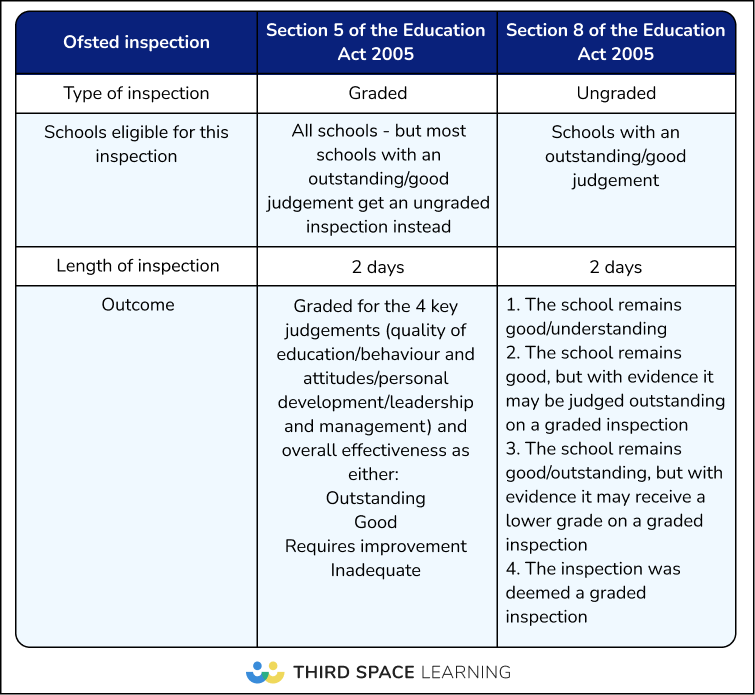
Section 5 Ofsted inspection framework
The section 5 Ofsted education inspection framework’s latest guidance came into force in September 2023. It has everything that primary schools, secondary schools, headteachers and other educational settings provisions need to know about an upcoming inspection.
It sets out the principles that inform how inspectors carry out inspections, what the lead inspector and the team take into consideration when making judgements and the arrangements made for different types of provision.
Under the section 5 framework, the following settings (including alternative provisions) can be subject to routine inspection – this includes good schools and outstanding schools that under the old framework would have been exempt from routine inspection (see school handbook paragraph 45):
- maintained schools, including community, foundation and voluntary schools
- maintained special schools, including community and foundation special schools
- maintained nursery schools
- academies, including:
- sponsor-led academies
- academy converter schools
- academy special schools
- alternative provision academies
- free schools
- special free schools
- university technical colleges (UTCs)
- studio schools
- city technology colleges
- city technology colleges for the technology of the arts
- certain non-maintained special schools approved by the Secretary of State under section 342 of the Education Act 1996
- pupil referral units (PRUs)
Ofsted inspectors will endeavour to speak and question as many stakeholders as possible, including governing bodies and pupils. Staff are expected to meet and chat through the curriculum (intent, implementation and impact), safeguarding and the culture of the school.
The lead inspector wants to gather as much first-hand evidence as possible. Ofsted inspectors will triangulate the information gathered, including safeguarding. If appropriate to the context of the setting and evidence found, Ofsted may wish to speak with the local authority also.
When it comes to safeguarding, all members of staff should be expected to be questioned and Ofsted will endeavour to meet with a range of stakeholders. In addition to the Designated Safeguarding Lead (DSL), headteacher and teaching staff, all staff who come into contact with children are responsible for safeguarding and child protection.
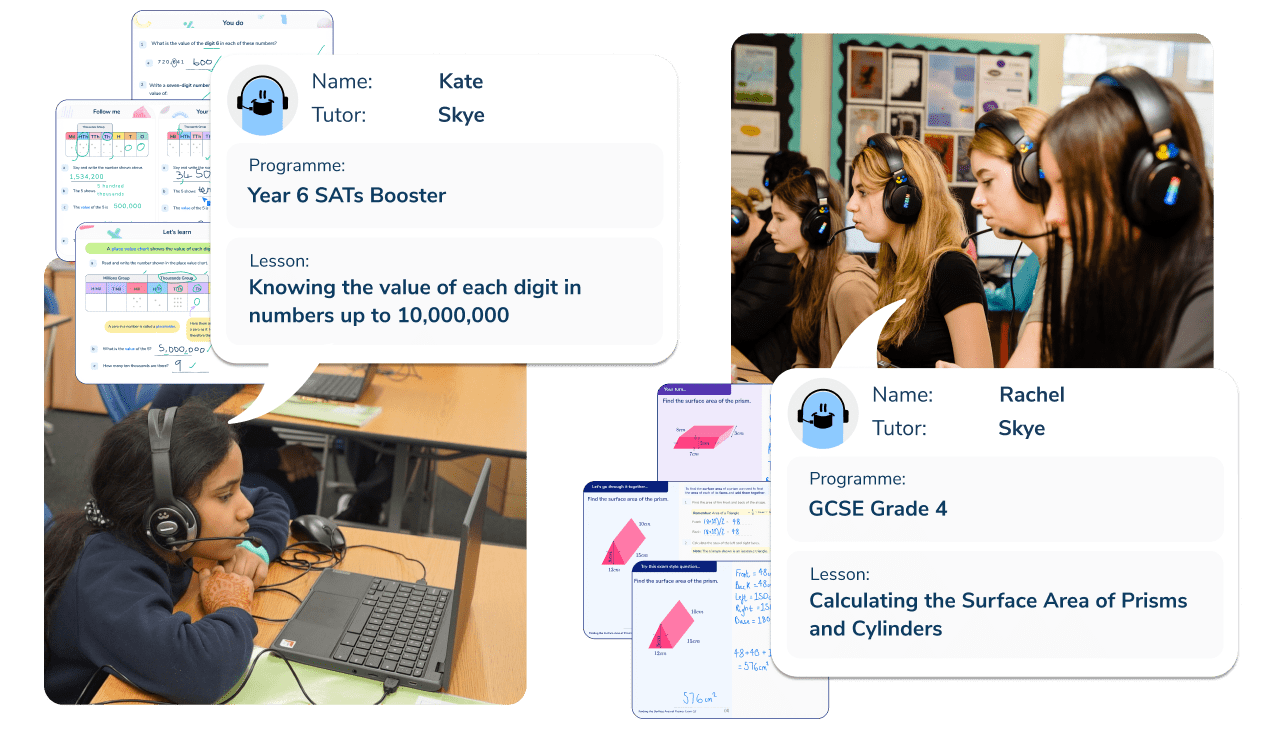
Meet Skye, the voice-based AI tutor making maths success possible for every student.
Built by teachers and maths experts, Skye uses the same pedagogy, curriculum and lesson structure as our traditional tutoring.
But, with more flexibility and a lower cost, schools can scale online maths tutoring to support every student who needs it.
Watch Skye in actionHow often should you expect a section 5 Ofsted inspection?
You can expect a section 5 routine Ofsted inspection at intervals no longer than 5 years apart, as outlined in Section 5 of the Education Act 2005.
An exception is if your school’s most recent inspection was before May 2021. In this situation, the legal interval is no more than 7 years.
The school inspection handbook states that as a rule, under the now-outdated single-word judgement of schools, Ofsted’s policy is that an outstanding or good school can expect their next inspection within 4 years of the last inspection and a provider with a rating of requires improvement or inadequate will be inspected within 30 months.
All providers with a ‘requires improvement’ or ‘inadequate’ grading against the Ofsted grade descriptors will receive a Section 5 inspection, along with a selection of good schools and outstanding schools. Under the new inspection framework, outstanding schools are subject to routine inspections. The previous exemption of this has now been removed.
Ofsted uses a risk assessment methodology which indicates whether the education provider requires a graded inspection. The elements of the risk assessment that may trigger a Section 5 inspection are:
- Data from the DfE
- Parent views
- Complaints made to Ofsted
- Safeguarding or serious concerns about welfare
These factors could also trigger an urgent inspection (A full list can be found in the inspection handbook paragraph 67).
Who is involved in a section 5 Ofsted inspection?
Ofsted is looking to converse with a range of staff so that they can triangulate evidence gained from ‘top-level’ questioning with the headteacher and senior leaders and the deep dive to make accurate judgements.
A big part of the inspection process is the conversations inspectors have with the senior leadership team, governing body, curriculum leaders, teachers, pupils and parents’ views. These conversations play a significant part when the inspection team make a judgement against the overall effectiveness and the quality of education in the setting.
Therefore, all members of staff can be involved in a section 5 Ofsted inspection, including the governing body, SENDCo, parents’ views and pupils. Below is a brief overview of what some stakeholders may expect:
Headteacher
Regular meetings to provide information on any emerging issues, and question emerging evidence. It is an opportunity for the headteacher to question Ofsted regarding any concerns or issues.
Early Career Teachers
Ofsted inspectors will question ECTs to gather their views on the school and how they are being supported.
Senior leaders
Ofsted may ask SLT about workload, curriculum intent, implementation and impact. They are looking to see that leaders engage with staff and are aware of workload.
Staff members
It is likely Ofsted will ask staff about workload, personal development and how leaders support them. Ofsted inspectors will question staff members about what is seen in their lessons and how they know the children have learnt and met outcomes but they will not grade lessons.
Subject leaders
Ofsted will ask a subject leader about progress and attainment in their subject, schemes of work and/or curriculum planning, questions about pupil premium children, children with SEND, learning interventions for ‘plugging gaps’ and questions about lesson observations.
What should you expect during a section 5 inspection?
Phone call
As part of the inspection process, the headteacher (or senior leader) will receive an initial phone call with the lead inspector. This could be anytime between 9.30am and 2pm the school day before the inspection takes place. Note that an Ofsted inspection can take place anytime after the first 5 days of the academic year and the graded inspection process usually lasts for 2 days.
The lead inspector will have 2 elements of focus: a short conversation planning the logistics of the inspection and a longer self-evaluation focused on the education, curriculum and school’s performance since the last inspection. Ofsted provides a comprehensive breakdown of what to expect from this phone call in paragraph 96 of the school inspection handbook.
As soon as this phone call is taken, the inspection has started! The lead inspector has started with some top-tier questioning. It is a chance for headteachers and senior leaders to set the tone and build a positive relationship through professional dialogue. Furthermore, the lead inspector must check on the well-being of the headteacher and address any concerns. Questionnaires will then be sent out for parent views.
Deep dive
Following the phone call, the inspection team will conduct an on-site visit to the school to carry out a deep dive into their selected subjects. HMI will speak, meet and question a range of stakeholders to gather evidence, including pupils.
It is during the Ofsted deep dive the inspection team will dig deeper into the curriculum, progress, assessment, leadership, behaviour and safeguarding. This will provide the majority of evidence for inspectors to make their judgement.
During the deep dive, Ofsted inspectors will endeavour to speak and question many members of staff. They will focus on 3 or 4 curriculum subjects during the deep dive. The school inspection handbook clearly states that “a series of joined-up professional conversations about education [is] at the heart of inspection”. So, expect Ofsted questions and be open, honest and reflective in dialogue. See our article on Ofsted deep dive questions to help you and your team prepare.
A big part of the deep dive is to support judgements made on the overall effectiveness of the quality of education. Inspectors will evaluate the curriculum using the three I’s: intent, implementation and impact. Section 238 of the school inspection handbook is particularly useful here for school leaders. It provides an extensive breakdown of the most important factors that Ofsted considers through their research and inspection experiences.
Gathering evidence
The priority of section 5 inspections is to gather first-hand evidence. The inspection team will collect, connect and triangulate evidence gathered for each area of judgement. Ofsted inspectors will complete work scrutiny, speak with pupils and meet with many stakeholders in the school. In addition, Ofsted will focus on safeguarding to ensure that you are carrying out statutory safeguarding and child protection responsibilities to promote the welfare of children.
During their visit, Ofsted will scrutinise records, documentation and any information that relates to pupil behaviour, attendance and safeguarding. Furthermore, Ofsted is interested in how senior leaders encourage all staff members to have a professional curiosity about safeguarding to keep children safe and uphold the statutory legislation set out in Keeping Children Safe in Education and guidance from the DfE (available on www.gov.uk).
It is important to note that when gathering evidence on pupils’ spiritual, moral, social and cultural education, personal development and behaviour and attitudes, Ofsted will collect evidence from anywhere that is relevant. This could include Religious Education, PHRSE and assemblies.
Ofsted grading
At the end of the inspection, all of the gathered information is brought together to make graded judgements against the key areas: overall effectiveness, quality of education, behaviour and attitudes, personal development and leadership and management (early years and sixth-form provision dependent on the setting).
The draft report can now be shared with the headteacher and senior leaders to discuss findings and the graded judgements. Schools have 5 days to comment on the draft report, inspection process and findings.
Finally, HMI provides the school with the final inspection report and the school has a responsibility to share it with parents within 5 days of receipt. When the school receives the final report, the inspection process is complete.
Below, we take a closer look at the grade descriptors used to make judgements during a section 5 Ofsted inspection.
Section 5 Ofsted grade descriptors
In a section 5 Ofsted inspection, graded judgements are given using the four-point grading scale:
- Outstanding
- Good
- Requires improvement
- Inadequate
As of May 2024, Ofsted will publish sub-judgements for all past and future graded school inspections carried out under the Education Inspection Framework, as well as the overall inspection grade.
As of September 2024, Ofsted will scrap single-word grade judgements for the overall effectiveness of schools.
The school inspection handbook sets out the criteria that guide Ofsted when making judgements but it does clearly state within it that the list is not exhaustive and doesn’t replace the inspection team’s professional judgement.
We recommend that school leaders and headteachers look at the grading descriptors for each of the judgement areas in the handbook:
- Quality of education: paragraph 453-454
- Behaviour and attitudes: paragraph 455-456
- Personal development: paragraph 457 – 458
- Leadership and Management: paragraph 459 – 460
To be graded outstanding is challenging. When making an outstanding judgement, the school must meet every good criterion consistently and securely, as well as the outstanding criteria. The school handbook clearly states that it is not good enough to be strong against some aspects and not against others.
When making good or requires improvement judgements, the inspecting team will use a best fit approach with their professional judgement. They will do this by looking at whether the overall quality of the school is closely matched to the descriptors.
An inadequate judgement will be given if any one of the inadequate criteria applies. The school will either be deemed to have serious weaknesses or be placed in special measures.
It is worth noting that Ofsted safeguarding is a huge part of a school inspection. Although inspectors will not grade safeguarding against the 4-point scale, a school can be graded inadequate if safeguarding is ineffective.
Safeguarding isn’t something that leaders and schools just ‘do’ for Ofsted but preparing for Ofsted safeguarding questions and answers will alleviate the stress on the day. Ensure that you are meeting Department for Education legislation such as KCSIE and ensure that all staff are confident with safeguarding procedures and how to report safeguarding concerns.
How can Third Space Learning help with a section 5 Ofsted inspection?
You can support your team in their preparation for a section 5 Ofsted inspection with our range of Ofsted resources. They make excellent resources for CPD and are suitable for primary and secondary schools.
- Ofsted Deep Dive Questions: Maths
- Ofsted Maths Fact File
- 2019 Ofsted Inspection Framework Breakdown For SLT & Governors
Section 5 Ofsted FAQs
Visits carried out under section 5 of the Education Act 2005 are also referred to as graded inspections. Ofsted will make a judgement on the overall effectiveness of the school as well as the four key judgement areas (Quality of education, Behaviour and attitudes, Personal development, Leadership and management) using the 4-point scale and grading descriptors to reach judgements.
Inspections carried out under section 5 of the Education Act 2005 are referred to as graded. Inspections carried out under section 8 of the Education Act 2005 are referred to as ungraded.
A section 5 inspection could be triggered by a complaint, a significant change in the school’s provision or if an assessment indicates a deterioration in provision.
Section 5 of the Education Act 2005 sets out the duty of the chief Ofsted inspector to undertake regular inspections of state-funded schools and to report on the results.
DO YOU HAVE STUDENTS WHO NEED MORE SUPPORT IN MATHS?
Skye – our AI maths tutor built by teachers – gives students personalised one-to-one lessons that address learning gaps and build confidence.
Since 2013 we’ve taught over 2 million hours of maths lessons to more than 170,000 students to help them become fluent, able mathematicians.
Explore our AI maths tutoring or find out about school tutors for your school.
